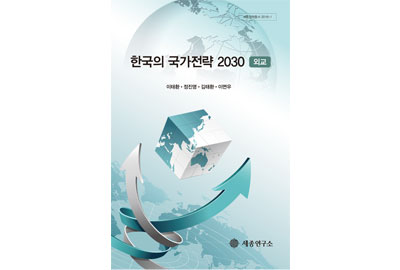This book analyzes South Korea’s diplomacy concerning its security strategies surrounding the region of Northeast Asia. For suggesting South Korea’s diplomatic strategy for the year 2030, this book considers the changing dynamics of U.S.-China relations and the prospects of Korean unification.
Around the year 2030, the U.S.-China relationship is expected to show an increased level of competition, but the bilateral relationship will not necessarily turn into heightened military conflicts.
The future direction of the U.S-China bilateral relations in 2030 hinges upon the intersubjective and mutual perceptions between the two and their resultant foreign policy strategies. In other words, any change in bilateral relationship is a result of interaction between the two parties. The future U.S.-China relations will show a combination of competition and cooperation. However, rising economic interdependence between the two will help assuage conflicts in political areas. With this projection, it is expected that there will be more cooperation than competition between Washington and Beijing around 2030.
Both globally and regionally, the U.S. and China have designed their grand strategies in order to expand their strategic influence, and Washington and Beijing’s foreign policies toward the Korean peninsula are based on these conditions. In this regard, changing dynamics in the U.S.-China relations will be a significant causal variable for changes on the Korean peninsula. However, whether Beijing’s idea of maintaining a “new type of major power relationship” with Washington will hold remains to be seen.
On North Korea’s fourth nuclear weapons test, Washington and Beijing have shown their willingness and capacity to cooperate with each other in spite of the ongoing conflicts in the South China Sea. In this regard, there is much room for South Korea to take advantage of the bilateral cooperation between Washington and Beijing. The changing dynamics of the U.S.-China relations are expected to significantly affect the structure of Northeast Asia’s regional order.
Numerous studies have predicted that the likelihood of Korean unification between 2020 and 2030 is relatively high. They have pointed out that with Korean unification, the U.S.-China relationship will enter into a new phase and that it will serve as a major turning point in the future bilateral relationship.
Based on the analysis of the overall international political environment, this book contends that South Korea’s national objective in 2030 should be becoming a hub of Asia-Pacific for denuclearization and peace and providing a leadership role in building various global governance structures. In order to achieve this goal, South Korea’s diplomatic strategy should first facilitate appropriate conditions for Korean unification. For gaining support from both the U.S. and China, this book contends that South Korea should maintain close bilateral ties with both Washington and Beijing in order to foster a framework of trilateral cooperation. Second, reconstructing regional order in Northeast Asia will take much time and the chances of establishing a framework for multilateral security cooperation by 2030 remain low. Thus, this book emphasizes on the importance of minilateral diplomacy and cooperation between South Korea, the U.S. and China as well as among South Korea, China, and Japan.
Third, this book contends that there is a need for diplomatic measures facilitating an economic regionalism in Northeast Asia. The Success of China’s “One Belt, One Road” strategy is crucial in this regard. It is also important to persuade China on the idea that Korean unification is a necessary element for the success of China’s “One Belt, One Road” strategy.
Fourth, it is necessary to engage in multistep and multilayered network diplomacy. The role of public diplomacy through non-governmental organizations and private think tanks is crucial in fostering sympathy and awareness from the citizens of other countries. A more systematic and comprehensive strategy should be developed while also taking into account various elements of particularities in each locality, country, and region.
Volume No.: 2016-1
Publisher: The Sejong Institute
Publication Date: April 25, 2016
Length: 162 Pages

